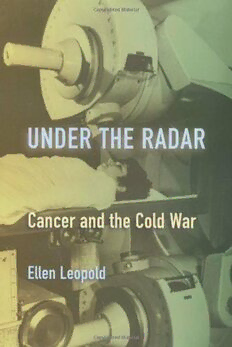
Under the Radar: Cancer and the Cold War (Critical Issues in Health and Medicine) PDF
300 Pages·2008·1.225 MB·English
Most books are stored in the elastic cloud where traffic is expensive. For this reason, we have a limit on daily download.
Preview Under the Radar: Cancer and the Cold War (Critical Issues in Health and Medicine)
Description:
At the end of the Second World War, a diagnosis of cancer was a death sentence. Sixty years later, it is considered a chronic disease rather than one that is invariably fatal. Although survival rates have improved, the very word continues to evoke a special terror and guilt, inspiring scientists and politicians to wage war against it. In Under the Radar, Ellen Leopold shows how nearly every aspect of our understanding and discussion of cancer bears the imprint of its Cold War entanglement. The current biases toward individual rather than corporate responsibility for rising incidence rates, research that promotes treatment rather than prevention, and therapies that can be patented and marketed all reflect a largely hidden history shaped by the Cold War. Even the language we use to describe the disease, such as the guiding metaphor for treatment, fight fire with fire, can be traced back to the middle of the twentieth century.Writing in a lucid style, Leopold documents the military, governmental, industrial, and medical views of radiation and atomic energy to examine the postwar response to cancer through the prism of the Cold War. She explores the role of radiation in cancer therapies today, using case studies and mammogram screening, in particular, to highlight the surprising parallels. Taking into account a wide array of disciplines, this book challenges our understanding of cancer and how we approach its treatment.
See more
The list of books you might like
Most books are stored in the elastic cloud where traffic is expensive. For this reason, we have a limit on daily download.
